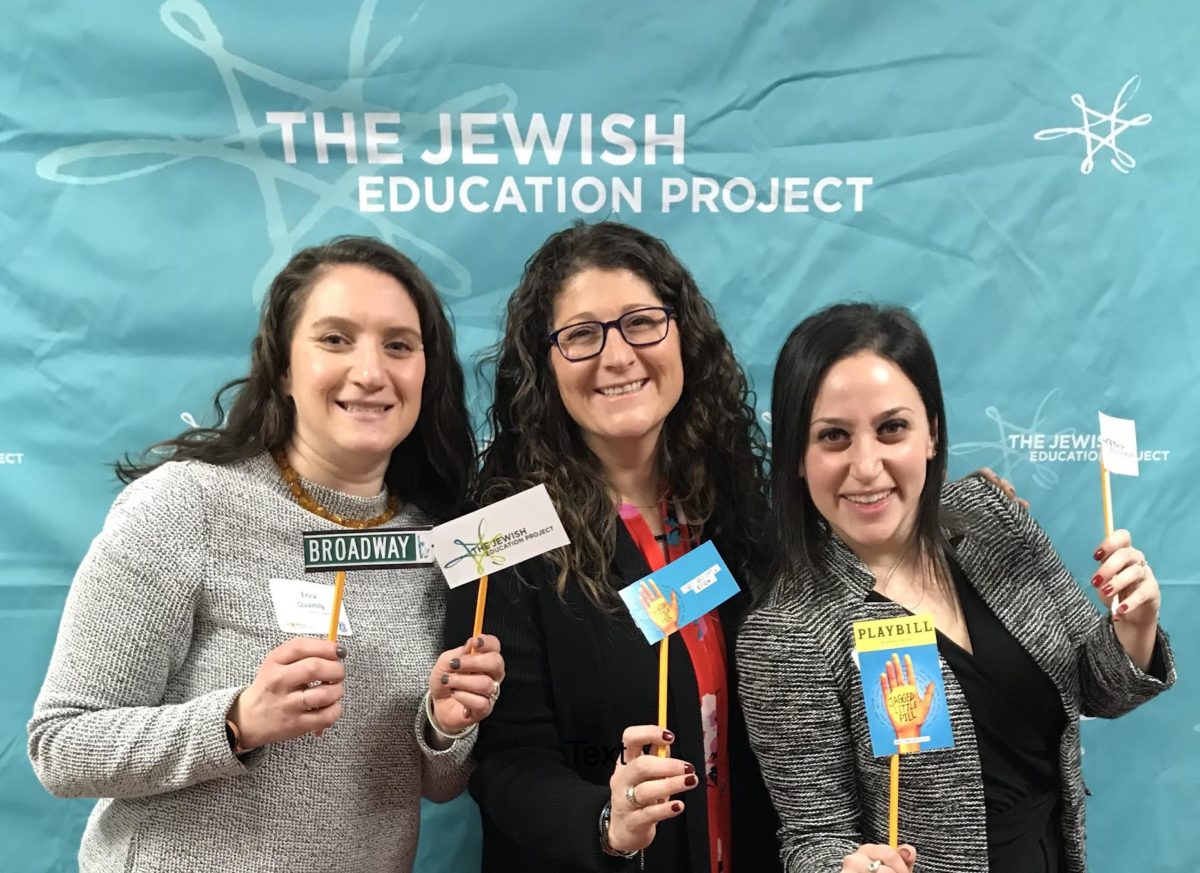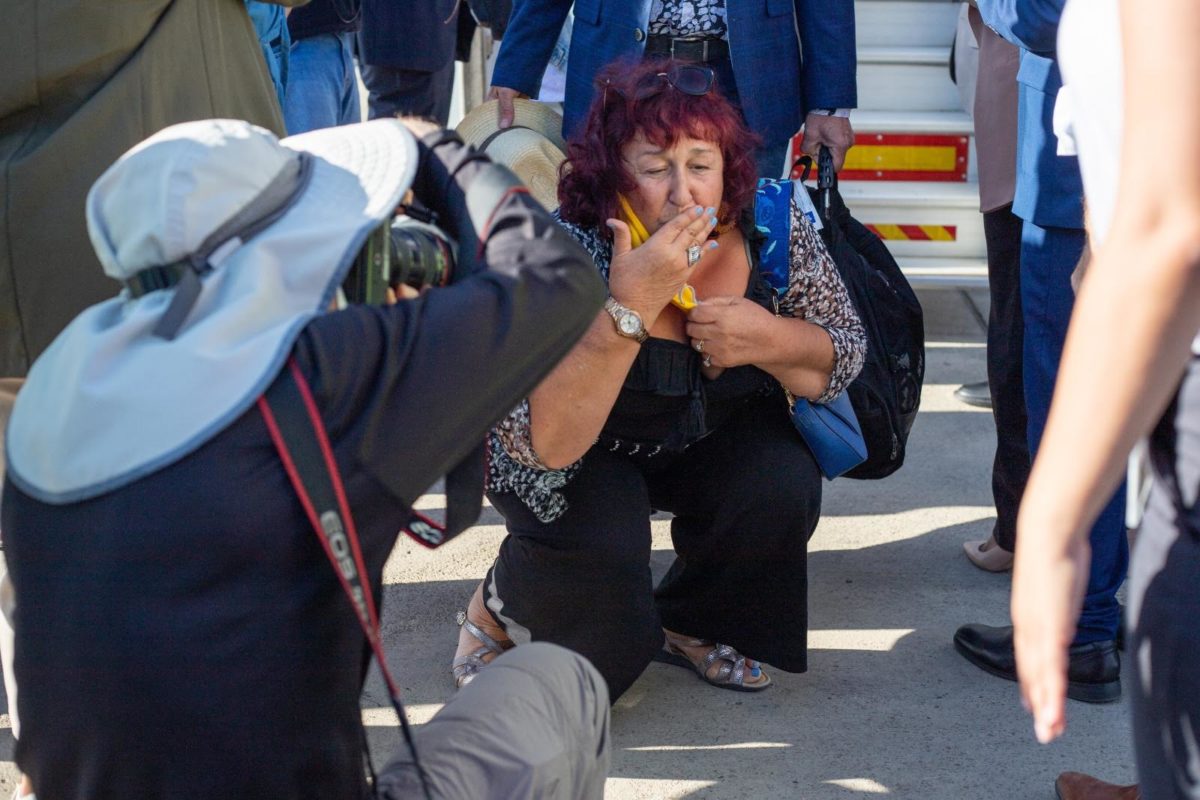Your Daily Phil: The Israeli startup that eases seniors’ loneliness + With $100 million in funding, One Happy Camper ups grant-making
Good Thursday morning!
Funders have invested $100 million in One Happy Camper, the incentive grant program for first-time attendees of Jewish overnight camp, Jeremy Fingerman, CEO of the Foundation for Jewish Camp (FJC), told eJewishPhilanthropy. That translates to grants for about 100,000 campers.
This summer, the program made almost 10,000 grants, about 30% more than a typical year, said Rebecca Kahn, senior director of field expansion at FJC. Due to last year’s cancellation of most camp programs and the restrictions on children’s lives during the pandemic, more families made camp a priority in 2021, she said: “They were eager to provide their children with a sense of belonging, independence and the simple joys that Jewish camps offer.”
One Happy Camper started in 2006 in Chicago with more than 500 grants, and more than 150 camps have participated in it to date.
EARLY ADOPTERS
Israeli startup Uniper eases loneliness among homebound seniors

Shutterstock
When the Network of Jewish Human Services Agencies (NJHSA) secured a grant in 2020 to pay for seven of its agencies to start using Uniper, an interactive online platform that helps ease loneliness among seniors, they thought it would be useful in working with Holocaust survivors. Then the pandemic hit, and now 19 of the network’s 140 agencies are using the technology, and with many more requesting access, NJHSA CEO Reuben Rotman told eJewishPhilanthropy’s Helen Chernikoff.
A personal need: “The impact has been profound,” Rotman said. “We never imagined the need for it would explode like this.” The company, which has offices in Los Angeles and Tel Aviv, has Israeli origins. Co-founders Rami Kirshblum, the CEO; Avi Price, the COO; and Meir Schreiber, the CTO, met in 2016 at an accelerator program called “8200” in a nod to the elite IDF intelligence unit, said Price. Schreiber’s mother, a Holocaust survivor, inspired the original idea of using the internet to facilitate interactions among homebound seniors, Price said. An electrical and computer engineer who had spent his career in the Israeli tech sector, Schreiber’s first instinct was to look for existing technology that could help her, but couldn’t find it.
Pragmatic mindset: Today, there are similar products, said Deborah Adler, manager of the Holocaust Survivors program at the Jewish Social Services Agency (JSSA), which serves the greater Washington, D.C., area, and Debbie Hedges, the agency’s director of senior services. “It’s Never 2 Late,” is a customized computer program that offers activities, but it’s for use in institutional settings, and “Senior Planet” works on a computer. Besides its interactive elements, one of the most useful aspects of Uniper is its ease of use compared to computers, Rotman said. Many people with older loved ones have concerns about the hours those seniors spend in front of the television, he noted, but Uniper recognizes that tendency and turns it into an advantage. “In social work, we have a saying, ‘You meet the client where they’re at,’” he said. “If that’s the TV, meet them at the TV.”
The Uniper guy: Uniper’s installation and interface is similar to that of a cable service. A technician comes to the home to install the equipment — a box that sits on top of the television, and a simple remote. The necessity of a home visit by the company was a problem during the pandemic, said Adler, so JSSA trained staff to do the installation in full personal protective equipment. Uniper can also work on a computer or tablet for those who are comfortable with devices. The system offers an onscreen schedule for its content, such as lectures and fitness classes. It can also be used to conduct remote medical appointments, and to connect with family members. The live programming has been most helpful to the 94 JSSA clients using Uniper, Adler said. JSSA offers a poetry class; support groups; and “Café D.C.,” a weekly discussion group that alternates between Russian and English that is facilitated by a staff member.
INSPIRATION
Being a Jewish educator: Is it a career or a calling?

Courtesy
“This week CASJE (Collaborative for Applied Studies in Jewish Education) begins to release findings from its ‘Career Trajectories of Jewish Educators Study,’ writes Arielle Levites, managing director of CASJE, in an opinion piece for eJewishPhilanthropy.
Titles are everything: “The title of the study is not accidental. A key decision that framed the study design and research was to characterize work in Jewish education as a career… ‘Beginning with the work of Bellah and his colleagues, in their landmark study Habits of the Heart, sociologists have distinguished people’s relationships to their work as jobs, careers and callings.’ Put succinctly: A job is something one does to pay the bills; a career involves a commitment to professional growth and advancement within one’s field of work; and a calling is work related to one’s larger sense of purpose.”
Mission and meaning: “CASJE’s study found that those who launch a career in Jewish education are highly mission-driven: they share a love of Jewish learning and a commitment to helping others. They seek work that is meaningful and provides fulfillment. This sense of mission and quest for meaning can sustain educators when their work or workplace environments are especially challenging.”
All is not a bed of roses: “[O]ur study found that Jewish educators are highly mission-driven and care about the work and the communities they serve. Yet, as the reports and briefs we will release over the next few weeks show, Jewish educators are also overall dissatisfied with their compensation, supervision, and opportunities for advancement. They report inadequate access to high-quality professional development. And, increasingly, the professional learning offered to them emphasizes the affective and relational over content and skills to effectively do their work.”
PROFESSIONAL DEVELOPMENT
The GENERATE Fellowship: A fellowship for early career teen engagement professionals

Teen educators at an event hosted by The Jewish Education Project in January 2020; courtesy
“Teens today are holding multiple tensions. On the one hand, teens are hopeful. For the first time in over sixteen months they are able to engage in activities indicative of normal teen development, like hanging out with friends in person, attending experiential opportunities like summer camp, and engaging in lifecycle moments like birthdays and graduations,” writes Jodie Goldberg, director of the GENERATE Fellowship, in an opinion piece for eJewishPhilanthropy.
On the front lines: “Even with the return to a more normal environment, however, some teens continue to face challenges. The trauma of the past year is still present and will continue to affect their social and emotional well-being into the future. Teen engagement professionals have been and will continue to be on the front lines designing and executing opportunities that meet the needs of their teens on an ongoing basis. As we re-envision a post-COVID reality in our learning environments, we must support teen engagement professionals, especially those new to the field, to understand the challenges of teens today, to recognize the tensions that arise in their professional roles, and to feel equipped to serve as mentors for their teens now and in the future.”
New fellowship: “Generously funded by the Jim Joseph Foundation… the GENERATE fellowship is a one-year fellowship experience to provide early career teen engagement professionals with the tools, skills and knowledge to become better mentors for their teens. In its pilot year, as the FindYourSummer.org Ambassadors program, the fellowship featured a six session arc of learning based on understanding Generation Z and how they see the world, combined with a 1:1 mentorship program for teen professionals in the New York area. Participants shared that they became more aware of the issues teens face today and ways to best support them and that their 1:1 mentoring helped them become stronger mentors for their teens.”
Worthy Reads
Breaking Through: Nonprofit professionals often use the phrase “getting to scale,” but its meaning as it’s commonly understood — size and reach — is not as helpful as it could be, reflects Kevin Starr in the Stanford Social Innovation Review. An intervention, such as a water purifying technology used in Kenya, Malawi and Uganda, that has enjoyed some success but can’t be replicated further cannot be said to scale, even if it’s helped a million people, he writes: “In other words, scale isn’t a number, it’s a curve. To ‘scale’ is to achieve sustained non-linear growth of impact and an increasing momentum that persuades us that something really big—the achievement of its full potential—may well happen.” [SSIR]
Trust Busting: Faith in nonprofit organizations breaks down along party lines, with Democrats tending to trust them more than Republicans, according to a new survey conducted in April and May by Independent Sector, a membership organization for nonprofits, foundations and corporate philanthropies. The report also revealed that while 45% of Americans trust nonprofit organizations to “do what is right,” only 4% feel that way about philanthropists or foundations, down from 15% last year. “In 2020, nonprofits stepped up to meet exponentially higher levels of need,” the survey states. “So why did the trust bubble burst and return to pre-pandemic levels in less than a year? [IndependentSector]
Green List: At its core, philanthropy is a way to translate private dollars into power, write the editors of Inside Philanthropy in a new recurring feature — a list of the sector’s 100 key players. It includes many unsurprising names, like Marc Benioff, CEO of Salesforce, former NYC Mayor Michael Bloomberg and Eric Kessler, founder of Arabella Advisors — but others, as well: “We’ve also spotlighted leaders of smaller foundations and funding intermediaries whose power derives less from the size of their checkbooks than the influence of their ideas or their savvy as organizers.” [InsidePhilanthropy]
Community Comms
Apply! Want to join the team at Jewish Insider/eJewish Philanthropy? We’re looking for a top-notch philanthropy editor. Learn more here.
Be featured: Email us to inform the eJP readership of your upcoming event, job opening, or other communication.
Word on the Street
Schwab Charitable announced that it facilitated 855,000 grants totaling $3.7 billion in fiscal year 2021 — a 13 percent year-over-year increase in total funding awarded to charities… The Rabbinical Council of America said in a statement issued yesterday that it “regrets the uncivil disruption by Orthodox Jews” of Tisha B’Av services held Saturday night by the Conservative movement in Israel… Jewish National Fund-USA launched “This is What Zionism Looks Like,” a campaign designed with the aim of celebrating Zionism and reclaiming what Zionism really means… CCS Fundraising released their new report, “Snapshot of Today’s Philanthropic Landscape, 10th Edition,” which compiles and contextualizes research from across the field of philanthropy to assist U.S. nonprofits sort through available data and create informed strategies… The Jewish Theological Seminary announced a new cohort of its signature professional development program, Day School Leadership Training Institute…
Pic of the Day

Jewish Agency for Israel
More than 150 new French immigrants to Israel arrived at Ben Gurion Airport yesterday morning aboard a special Aliyah flight from Paris.
Birthdays

Getty Images
Winner of eight Academy Awards, eleven Grammy awards, pianist and composer of many Disney movie musical scores, Alan Menken…
Israeli film and theatre actress, Gila Almagor… British Conservative Party member of Parliament for 36 years (74-10), Anthony Steen CBE… Historian, author and professor (now emerita) at the University of Wisconsin-Madison, Judith Walzer Leavitt… British biochemist and professor at the University of Dundee in Scotland, Sir Philip Cohen… Actor, director and comedian, Albert Brooks (born Albert Lawrence Einstein)… Past president of the Jewish Community Relations Council of Detroit, owner of Nodel Parks, Richard Martin Nodel… Owner of Baltimore’s Seven Mile Market, Hershel Boehm… Born in Norwalk, Connecticut and now based in Munich, Germany where he is the managing director of a public affairs firm and works to ensure that the Holocaust and its many victims are not forgotten, Terry Swartzberg… Judge of the U.S. District Court for the District of Columbia since 2011, Judge Amy Berman Jackson… Member of AJC’s Jewish Religious Equality Coalition, Cindy Masters… Former Secretary of Veterans Affairs, David Jonathon Shulkin… Founding partner of the DC-based intellectual property law firm Greenberg & Lieberman, Stevan Lieberman… Television journalist and news anchor, David Shuster… Owner of West Bloomfield-based Saltsman Industries, Daniel A. Saltsman… Former Pentagon official, now a consultant on operations and political intelligence, Jonathan Freeman… Contemporary artist living in Brooklyn, Dustin Yellin… Director of the field operations team at the Pew Charitable Trust, Elise Rachel Shutzer… Nominee as an associate justice on the New Jersey Supreme Court, Rachel Wainer Apter… Former White House assistant press secretary, now the managing editor of podcasts at NBC News, Reid Cherlin… White House correspondent, Andrew Grant Feinberg… General Treasurer of the State of Rhode Island, he was elected in 2014 and re-elected in 2018, Seth Magaziner… Executive director of the American Sephardi Federation, Jason Guberman-Pfeffer… Actor best known for his role in Pretty Little Liars, Keegan Phillip Allen… CEO and co-founder of n*gram health, Maor Cohen… Talia Thurm Abramson… Serial entrepreneur and software strategist, Yoela Palkin… Actor and voice actor, Skyler Gisondo… Director of speechwriting and a senior adviser to Secretary of Defense Lloyd Austin., Warren Bass…
Email Editor@eJewishPhilanthropy.com to have your birthday included.








